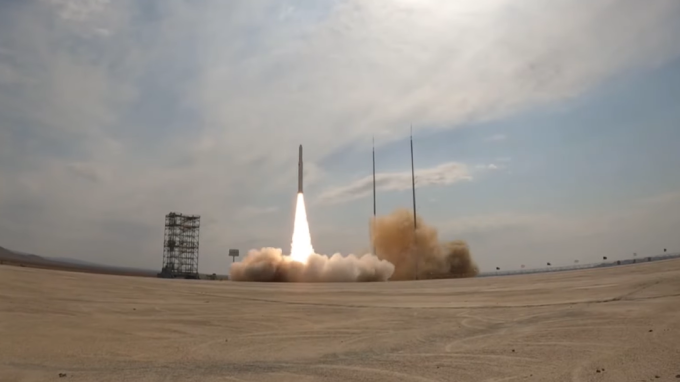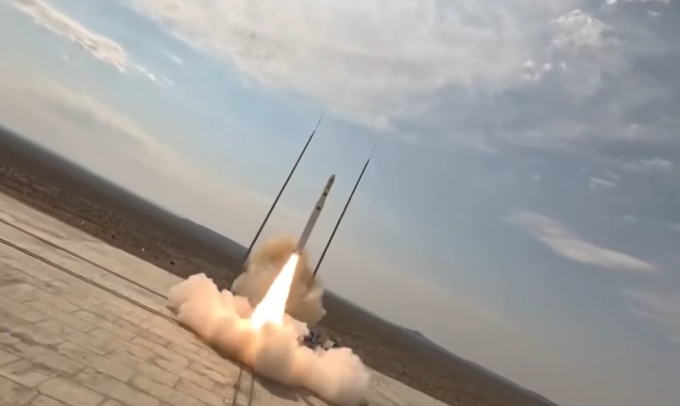Iran launches Chamran-1 satellite amid Western concerns over missile tech
Iran successfully launched its Chamran-1 research satellite into orbit on Saturday, utilising the Qaem-100 rocket developed by the paramilitary Revolutionary Guard, the state-run media reported. The launch marks a milestone in Iran’s aerospace program, which has faced scrutiny and criticism from Western nations due to concerns that the technology could be repurposed for ballistic missile development.
The Chamran-1 satellite, weighing 60 kilograms, was placed into a 550-kilometer orbit and it is designed to test “hardware and software systems for orbital maneuver technology”, the Iranian media stated. Initial signals from the satellite were confirmed by land stations shortly after the launch, indicating a successful deployment.

The Qaem-100 rocket, a solid-fuel, three-stage vehicle, was previously used in January for another successful satellite launch. Footage from the launch showed the rocket blasting off from a mobile launcher at a site near Shahroud, approximately 350 kilometers east of Tehran, AP reported. The rocket “Qaem,” which translates to “upright” in Farsi bore a Quranic verse: “That which is left by Allah is better for you, if you are believers.”.
The satellite launch occurs against a backdrop of heightened tensions in the Middle East, particularly due to the ongoing Israel-Hamas conflict. Iran’s military actions, including a recent missile-and-drone attack on Israel, have further escalated regional tensions. Additionally, the launch coincides with the second anniversary of the death of Mahsa Amini, whose passing sparked widespread protests against Iran’s mandatory hijab laws and the broader political system.
The launch is also significant as it is the first under Iran’s new reformist President Masoud Pezeshkian, following the death of his predecessor Ebrahim Raisi in a helicopter crash earlier this year. The future direction of Iran’s space program under Pezeshkian remains uncertain, as he has yet to publicly articulate his stance on these initiatives.
 The launch coincides with the second anniversary of the death of Mahsa Amini, whose passing sparked widespread protests against Iran’s mandatory hijab laws and the broader political system. AP
The launch coincides with the second anniversary of the death of Mahsa Amini, whose passing sparked widespread protests against Iran’s mandatory hijab laws and the broader political system. AP
International reactions
The launch has intensified concerns among Western nations, particularly the United States, which views Iran’s space program as a potential cover for developing intercontinental ballistic missile (ICBM) capabilities. US officials have reiterated that Iran’s space launch vehicle programs could provide a pathway to enhance its missile systems, which could eventually be capable of delivering nuclear warheads. US intelligence agencies and the International Atomic Energy Agency (IAEA) say Iran had an organised military nuclear program up until 2003.
Despite these concerns, Iran maintains that its space activities are purely civilian and defensive in nature. Iranian officials, including General Hossein Salami, head of the Revolutionary Guard, have highlighted the importance of overcoming international sanctions to advance their aerospace initiatives. Iran has consistently denied any intention to develop nuclear weapons, asserting that its nuclear and space programs are intended for peaceful purposes.
 The launch is also significant as it is the first under Iran’s new reformist President Masoud Pezeshkian. AP
The launch is also significant as it is the first under Iran’s new reformist President Masoud Pezeshkian. AP
What are Intercontinental ballistic missiles?
Intercontinental ballistic missiles (ICBMs) are a type of ballistic missile with a range greater than 5,500 kilometers and are primarily designed to deliver nuclear warheads. They can carry conventional, chemical, and biological weapons, although the latter types have rarely been deployed on ICBMs.
The United States, Russia, China, France, India, the United Kingdom, Israel, and North Korea are known to possess operational ICBMs, with Pakistan being the only nuclear-armed state that does not have them.
Disclaimer: The copyright of this article belongs to the original author. Reposting this article is solely for the purpose of information dissemination and does not constitute any investment advice. If there is any infringement, please contact us immediately. We will make corrections or deletions as necessary. Thank you.





